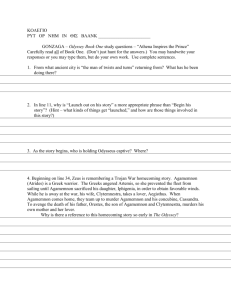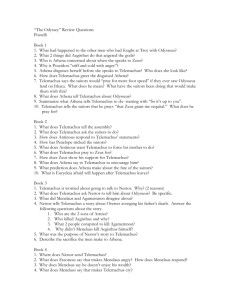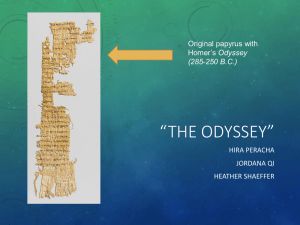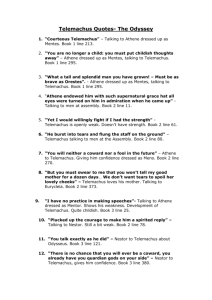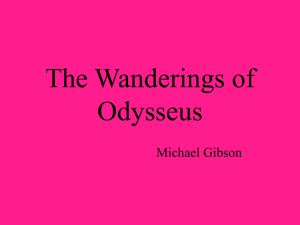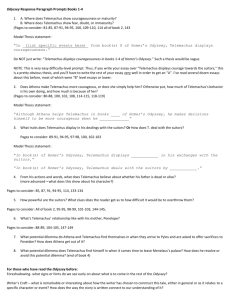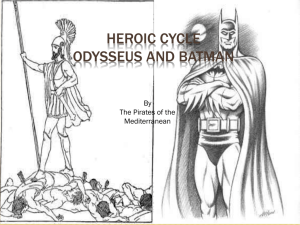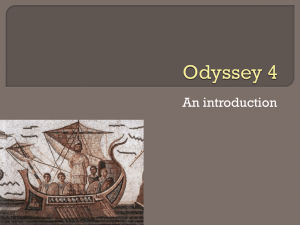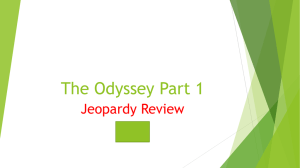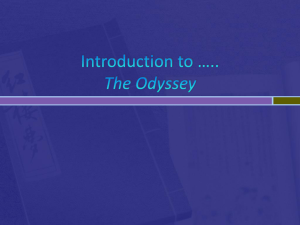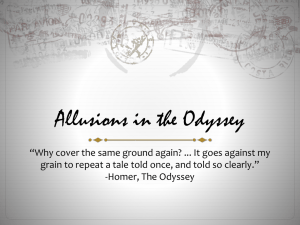OdysseyPart1
advertisement
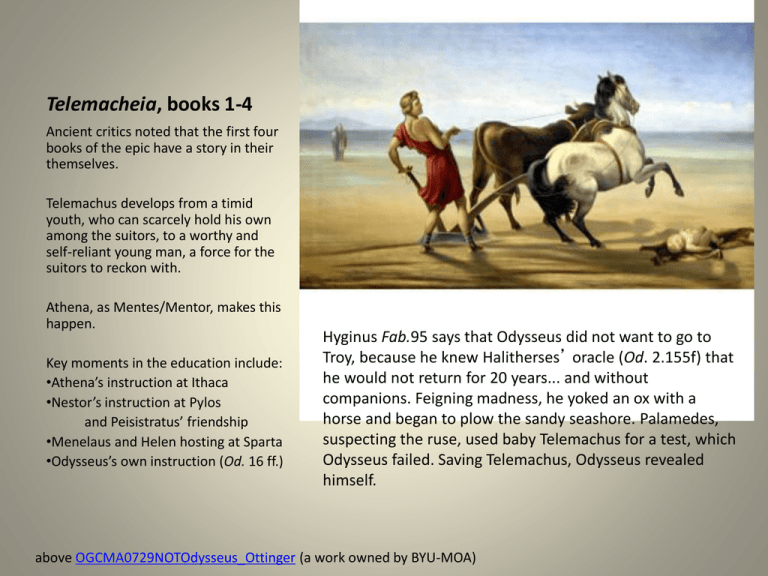
Telemacheia, books 1-4 Ancient critics noted that the first four books of the epic have a story in their themselves. Telemachus develops from a timid youth, who can scarcely hold his own among the suitors, to a worthy and self-reliant young man, a force for the suitors to reckon with. Athena, as Mentes/Mentor, makes this happen. Key moments in the education include: •Athena’s instruction at Ithaca •Nestor’s instruction at Pylos and Peisistratus’ friendship •Menelaus and Helen hosting at Sparta •Odysseus’s own instruction (Od. 16 ff.) Hyginus Fab.95 says that Odysseus did not want to go to Troy, because he knew Halitherses’ oracle (Od. 2.155f) that he would not return for 20 years... and without companions. Feigning madness, he yoked an ox with a horse and began to plow the sandy seashore. Palamedes, suspecting the ruse, used baby Telemachus for a test, which Odysseus failed. Saving Telemachus, Odysseus revealed himself. above OGCMA0729NOTOdysseus_Ottinger (a work owned by BYU-MOA) OGCMA0000NOTAjaxMinor_Serrur ΝΟΣΤΟΙ (νοστός) = “returns” or “The Returns” (a sub-class of ancient epic poetry Epic bards set themselves the task of telling how the Achaeans and other Greeks got home from Troy at the end of the War. Agamemnon, Orestes’ revenge, Menelaus’ homecoming, Ajax (the lesser, or “Locrian”), Odysseus and so forth... Each hero’s return is worth an epic telling. Homer’s Odyssey is a representative of this class of poems, but worked up with Homeric grandeur. Phemius’s song in Od. 1.300 Why this detail in Odysseus’ home? OGCMA0287Cassandra_Solomon i>clicker quiz What is the first action in Homer’s Odyssey, the very first thing that happens within the narrative (after the invocation of the Muses)? A. Athena comes to visit Telemachus. B. Athena asks Zeus why he hates Odysseus. C. Zeus speaks to the Olympians about Aegisthus and Orestes. D. Zeus sends Hermes with a message for mortals. i>clicker quiz What is the first action in Homer’s Odyssey, the very first thing that happens within the narrative (after the invocation of the Muses)? A. Athena comes to visit Telemachus. B. Athena asks Zeus why he hates Odysseus. C. Zeus speaks to the Olympians about Aegisthus and Orestes. D. Zeus sends Hermes with a message for mortals. “His mind was full of Lord Aegisthus, slain by renowned Orestes, the child of Agamemnon; with him in mind Zeus began to speak to the Deathless Ones…” i>clicker quiz Why are there many suitors hanging around Odysseus’ place? A. They want to marry Odysseus’ oldest daughter B. They are buddies of Telemachus and they are fellowshipping him while his dad’s away. C. They believe Odysseus is dead and they want to marry Penelope. D. None of these is true i>clicker quiz Why are there many suitors hanging around Odysseus’ place? The suitors have been thronging the home of Odysseus more and more in recent months, like vultures at road kill. (My simile.) A. They want to marry Odysseus’ oldest daughter B. They are buddies of Telemachus and they are fellowshipping him while his dad’s away. C. They believe Odysseus is dead and they want to marry Penelope. D. None of these is true i>clicker quiz Who is this Aegisthus that’s mentioned so often in the Odyssey? A. Agamemnon’s cousin and claimant to the throne of Argos. B. Clytemnestra’s chief “suitor”. C. An Argive killed by Orestes. D. An Argive captain in the Trojan War who fought valiantly thee. E. None of these is true i>clicker quiz Who is Aegisthus? Aegisthus and Clytemnestra participated in the murder of Agamemnon upon his return from Troy. Later, Orestes (and Electra) exacted divinely appointed vengeance and killed them both. A. Agamemnon’s cousin and claimant to the throne of Argos. B. Clytemnestra’s chief “suitor”. C. An Argive killed by Orestes. D. An Argive captain in the Trojan War who fought valiantly thee. E. None of these is true i>clicker quiz Who only could have said this and to whom? “The great island chieftains .. have all come to woo my mother, and they are devouring my inheritance. And although the thought of marriage is hateful to her, she dare not refuse outright and make and end of it.” A. B. C. D. Telemachus to Mentes Telemachus to Mentor Telemachus to Antinous Telemachus to Penelope i>clicker quiz Who only could have said this and to whom? “The great island chieftains .. have all come to woo my mother, and they are devouring my inheritance. And although the thought of marriage is hateful to her, she dare not refuse outright and make and end of it.” A. B. C. D. Telemachus to Mentes Telemachus to Mentor Telemachus to Antinous Telemachus to Penelope Tricky, but not a trick! In Odyssey 2.401 Athena disguises herself as “Mentor”; but, in Odyssey 1, where he’s setting forth the problem, Telemachus thinks he is talking to Mentes. i>clicker quiz At the end of Book 5, Odysseus survives a shipwreck and pulls himself to safety on the island of Scheria. Before he decides on a course of action he speaks the following words: “Alas, what will happen to me now? What will become of me after all? … I am almost at my last gasp.” To whom does Odysseus speak at this point? Odysseus speaks to A. The princess Nausicaa B. The goddess Athena C. The “stern god of the sea” (i.e. Poseidon) D. Telemachus E. None of these i>clicker quiz At the end of Book 5, Odysseus survives a shipwreck and pulls himself to safety on the island of Scheria. Before he decides on a course of action he speaks the following words: “Alas, what will happen to me now? What will become of me after all? … I am almost at my last gasp.” To whom does Odysseus speak at this point? Odysseus speaks to A. The princess Nausicaa B. The goddess Athena C. The “stern god of the sea” (i.e. Poseidon) D. Telemachus E. None of these Tricky, but not a trick, technically! Odysseus speaks “to his ardent soul” (his megathumos) i>clicker quiz A simile in Od. 4.791 ff. likens a particular person to a lion. “As a lion ringed by a band of hunters is filled with bewilderment and fear as they close their cunning circle round him, in such bewilderment lay [this person] until welcome sleep came suddenly.” Whom does Homer liken here to this lion? A. B. C. D. E. Odysseus Telemachus Menelaus Penelope Helen i>clicker quiz A simile in Od. 4.791 ff. likens a particular person to a lion. “As a lion ringed by a band of hunters is filled with bewilderment and fear as they close their cunning circle round him, in such bewilderment lay [this person] until welcome sleep came suddenly.” Whom does Homer liken here to this lion? A. B. C. D. E. Odysseus Telemachus Menelaus Penelope Helen Homeric similes often compare moments of domestic life to moments in the wild, as here (hunted lion to besieged mistress). i>clicker quiz In Menelaus’ palace in Sparta, Telemachus enjoys hospitality offered by the most gracious hostess ever to have occupied Menelaus’ palace. This same hostess does something to “dispell all grief and anger and banish remembrance of every trouble.” What does she do? And who is she? A. Nausicaa provides refreshing baths at her father’s thermal complex. B. Queen Arete provides a sumptuous meal of sacrificial meats. C. Helen of Troy spikes the winebowl with a special drug. D. Athena shows her true identity to the assembled heroes. i>clicker quiz In Menelaus’ palace in Sparta, Telemachus enjoys hospitality offered by the most gracious hostess ever to have occupied Menelaus’ palace. This same hostess does something to “dispell all grief and anger and banish remembrance of every trouble.” What does she do? And who is she? A. Nausicaa provides refreshing baths at her father’s thermal complex. B. Queen Arete provides a sumptuous meal of sacrificial meats. C. Helen of Troy spikes the winebowl with a special drug. … VERY WEIRD. D. Athena shows her true identity to the assembled heroes. i>clicker quiz Some host tells Telemachus the tawdry tale of Aegisthus’ involvement with Clytemnestra, starting in this way: “… If [only] Menelaus returning from Troy had found Aegisthus alive in those halls. … We were still encamped at Troy, still fighting out many a contest, when Aegisthus, sheltered deep in the Argive plain that pastures horses, had begun already with his cajolings to tempt Agamemnon’s wife. And at first Clytemnestra would not consent to the deed of shame.” Which of Telemachus’ hosts informs the boy about Aegisthus’ behavior? A. B. C. D. E. Mentes Mentor Agamemnon’s shade Nestor Peisistratus i>clicker quiz Some host tells Telemachus the tawdry tale of Aegisthus’ involvement with Clytemnestra, starting in this way: “… If [only] Menelaus returning from Troy had found Aegisthus alive in those halls. … We were still encamped at Troy, still fighting out many a contest, when Aegisthus, sheltered deep in the Argive plain that pastures horses, had begun already with his cajolings to tempt Agamemnon’s wife. And at first Clytemnestra would not consent to the deed of shame.” Which of Telemachus’ hosts informs the boy about Aegisthus’ behavior? A. B. C. D. E. Mentes Mentor Agamemnon’s shade Nestor : see Od. 4.250 ff. Peisistratus i>c q Who, or what, is XENIA? A. An unwritten code concerning the ritualized friendship between guests and hosts B. An Amazon warrior, played by Lucy Loveless in a late TV series C. a term that characterizes the misbehavior of the suitors, of Polyphemus, and of Paris in Menelaus’ house i>c q Who, or what, is XENIA? A. An unwritten code concerning the ritualized friendship between guests and hosts. From Grk ξένος “stranger” comes ξενία “the rights of a guest, hospitality, friendly entertainment or reception” B. An Amazon warrior, played by Lucy Loveless in a late TV series C. a term that characterizes the misbehavior of the suitors, of Polyphemus, and of Paris in Menelaus’ house i>cq At one point in Od.4, a certain woman descends a staircase and Homer likens her to the goddess Artemis. Who is it? A. B. C. D. E. Arete Nausicaa Helen Penelope Clytemnestra i>cq At one point in Od.4, a certain woman descends a staircase and Homer likens her to the goddess Artemis. Who is it? A. B. C. D. E. Arete Nausicaa Helen Od. 4.120f. Penelope Clytemnestra Think about it. i>cq Which mortal woman is compared in a dramatic epic simile to a cornered lion in Od. 4? A. B. C. D. E. Arete Nausicaa Helen Penelope Clytemnestra i>cq Which mortal woman is compared to a cornered lion in a dramatic epic simile in Od. 4? A. B. C. D. E. Arete Nausicaa Helen Penelope Od. 4. 800 ff. Clytemnestra Highly provocative. Don’t you agree? i>cq Which of the Greeks returned home via Egypt and met there the “old man of the sea” Proteus? A. B. C. D. E. Aias (or Ajax) Agamemnon Odysseus Menelaus Philoctetes i>cq Which of the Greeks returned home via Egypt and met there the “old man of the sea” Proteus? A. B. C. D. E. Aias (or Ajax) Agamemnon Odysseus Menelaus Philoctetes Menelaus disguises himself in seal skins and wrestles with the Protean god before wresting from him the info needed to return home safely. Helps for studying the Odyssey This Powerpoint lecture-note set, and subsequent sets Some Study Questions for Homer’s Odyssey Listing of Names of Importance The timeline called 40 Days of the Odyssey Mythological in the Odyssey: the gods and their functions Zeus and his ponderings on Aegisthus... Hermes was sent to advise Aegisthus. Athena takes the lead... Zeus and xenia underpin it all. Helen likened to Artemis on arrival (4.122) Poseidon’s ticked off from the start (i.e. see the proem). ΧΕΝΙΑ (χενία) = guest/host relations The ready measuring-stick in the epic. “...then [the boy] saw Athene. He made straight for the outer porch, inwardly vexed that a guest should stand at the door so long; he came up to her, clasped her right hand and took the bronze spear while his words came in rapid flight: ‘Greeting, friend; you shall be made welcome here; afterwards, when you have had your meal, you shall tell us what service you require.’” Shewring trans, Odyssey 1.120 ff. There are positive and negative exempla. Excerpt from J.L. David, “The Loves of Paris and Helen OGCMA0834ParisAndHelen_David Correspondence: Odyssey and Oresteia • Odysseus • Penelope • Antinous, Eurymachus, and their ilk* • Telemachus • Etc? • Agamemnon • Clytemnestra • Aegisthus • Orestes • Etc? * Penelope’s demeanor in the face of multiple suitors makes her that many times better than Clytemnestra. Penelope’s challenge is of epic proportions.
